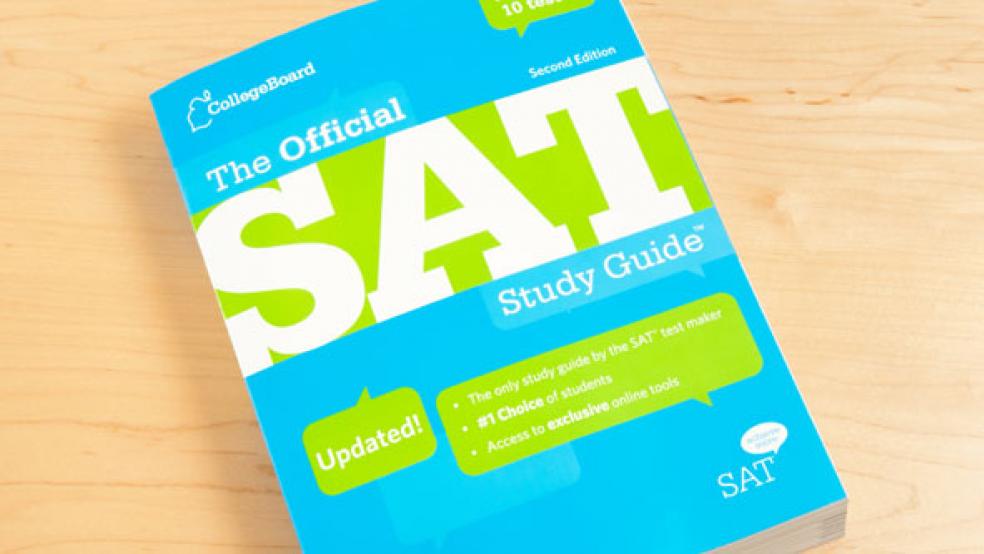Jeffrey Arnold’s 16-year-old daughter is a high school junior in Las Vegas, Nevada, hoping to get into pre-med programs at Johns Hopkins, Colorado State, or the University of Nevada. To help boost her SAT and ACT scores, Arnold hired a test prep tutor – at $125 an hour. They’ve done six hours so far, with another four planned –a total of $1,250.
Another parent in New York State said she estimates she’ll spend more than $2,000 for an SAT tutor for each of her two sons. And that doesn’t include the $50 test fee each time her sons take the SAT.
RELATED: The One College Expense You Forgot to Factor In
Over 1.66 million students took the SAT (Scholastic Assessment Test) last year, and for the first time, the number of students who took the ACT (American College Testing) surpassed SAT takers by about 2,000 students. Many students take both tests, take them multiple times during their junior and senior years, and take the PSAT, SAT II subject tests, and Advanced Placement tests. These tests are an industry unto themselves, with millions of dollars spent on test fees, administration, and preparation.
The tests also carry additional fees for late registration, standby testing, registration changes, scores by telephone, and extra score reports, each of which ranges between $11 and $55. All this so that parents can write the real checks later and kids can rack up serious debt through student loans. But for most, paying to get an “edge” on standardized test scores is not only worth it, it’s necessary. Why? Because the competition is doing it.
QUEST FOR SUCCESS
The College Board and the Educational Testing Service, both private nonprofit educational testing organizations, administer the SAT. The ACT is administered by ACT, Inc, also a private non-profit.
Americans for Educational Testing Reform has criticized the organizations for collecting millions in profits while maintaining their nonprofit status and therefore avoiding federal taxes. College Board spokesperson Leslie Sepuka, says, however, that all of their profits are invested back into programs and services, including a fee waiver program for low-income students.

The executive salaries at these organizations have also come under fire in recent years. The former president of the College Board, Gaston Caperton, for example, took in $1.3 million, including deferred compensation in 2009, according to tax records--more than the president of Harvard University. He stepped down last year and his successor, David Coleman, now earns a base salary of $550,000, with total compensation of nearly $750,000.Richard Ferguson, the former CEO of ACT, Inc., received $1.1 million including retirement benefits in 2009.
“Congress should take a hard [look] at these tax-exempt testing companies that pay big-time salaries and seem to want to shake every dollar possible out of the pockets of students applying to college,” Dean Zerbe, a former senior tax counsel for the Senate Finance Committee, told Bloomberg.
According to a March report from IBISWorld, although profits fell briefly during the recession, the tutoring and test prep industry generates an average of $840.4 million every year and employs more than 115,000 people. And a 2009 report from Eduventures calculated that about 2 million students spend $2.5 billion a year on test preparation and tutoring.
RELATED: A Degree from Where? Why Your College Could Go Bankrupt
Private test prep tutors, like the one Jeffrey Arnold of Las Vegas is using, range from $100 to $200 an hour, and on-site classes from companies like Kaplan and Princeton Review charge around $1,000, though less expensive online courses are available.
Daniel Riseman, 40, a full-time college test prep tutor and founder of Riseman Educational Consulting in Westchester County, New York, says he tutors about 30 students a week and demand for his services is growing – one year he took in $220,000, he says. “Sometimes I work seven days a week and it just never stops, but it’s good money,” says Riseman, who has teaching certifications in English and math and a Master’s degree in education. “One parent said, ‘If I don’t hire you, I’m doing my daughter a disservice.’”
GROWTH INDUSTRY
As the economy improves – and as college competition increases – spending from parents on test prep and tutoring is expected to rise in coming years, according to the IBISWorld report. It says the industry will grow an average of 4 percent a year for the next 10 years.
Many reports have questioned the worth of these classes, though, and the National Association for College Admission Counselors concluded in a 2009 study that test-prep activities have a “minimal positive effect on both the SAT and the ACT.” Companies like Kaplan have stopped using promotional materials that mention specific point increases. Russell Schaffer, a Kaplan spokesperson, said that they focus instead on students’ personal test goals. Riseman, however, says he’s seen students’ scores rise as much as 600 points after 3 to 6 months of tutoring.
A handful of states – most recently North Carolina - require high school students to take the ACT, and market the test as a high school exit exam to gauge students’ college readiness. Many states test students through the ACT’s “College and Career Readiness System” to measure students’ academic development in the years before they take the official ACT. The ACT is currently developing a test for students to take in the third grade.
However, recent backlash against these college entrance exams has decreased the popularity of the SAT and ACT in some areas, and more colleges have stopped requiring the test, claiming they’re not accurate measures of students’ abilities. As of 2012, more than 800 colleges no longer require either exam, including Middlebury College in Vermont, Bowdoin College in Maine, and Wake Forest University in Winston-Salem, N.C.
Data from the College Board show that test-takers with family incomes of less than $20,000 a year consistently score lower on average than those test-takers with family incomes of over $200,000. One calculation from DOME Exam Prep showed a 40-point average score increase for every additional $20,000 in family income. “All these exams are highly coachable, advantaging students who can afford to spend $800 or more on test preparation classes,” write the authors of FairTest, an advocacy group for promoting fair evaluations of students.




